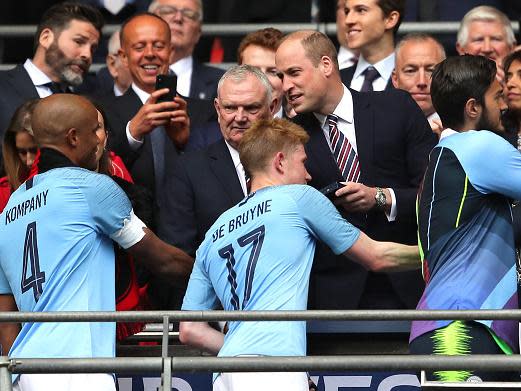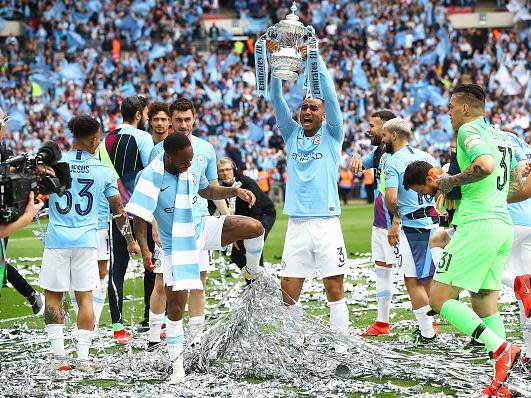Why Manchester City’s unprecedented treble is a product of trend rather than an outstanding achievement
It was one of few moments of real tension on an otherwise predictable day, and it of course didn’t take place on the Wembley pitch.
It was when Rob Harris of AP asked Pep Guardiola about the ongoing investigations into Manchester City, accusations that their domestic treble has consequently been “diminished” and finally – to the Catalan’s evident anger – whether he had “received payments from Abu Dhabi for services other than managing” the club, as was alleged with Roberto Mancini.
Guardiola, having initially rather calmly answered the first two questions by re-asserting his trust in his bosses, was anything but calm now. He was affronted, as his facial expression and frustrated exhalation of air gave away.
“Do you know the question you are asking me,” the City manager said, querying the gall of such a question at such a time. “Do you think I deserve this kind of question?”
Up alongside the journalists, Manuel Estiarte – who is one of Guardiola’s closest advisors – reacted in exasperation, throwing his right arm into the air. This wasn’t what they wanted to be discussing. Such issues aren’t really what anyone wants to be discussing after such events, or feats.
Except, beyond the more specific last question asked by Harris, there is really never a better time to discuss the wider concerns behind what we saw in the FA Cup final. It certainly felt fair to ask whether this 6-0 procession against Watford was even a “match” at all. It didn’t feel like it as early as 2-0. It ultimately became a bit of a farce, as well as something bigger.
What exactly were we watching? That thought was never more prevalent than after the game, when players from a team owned by a member of the Abu Dhabi royal family, wearing shirts emblazoned with the brand of an Abu Dhabi airline, lifted a historic trophy sponsored by the same company. All of this was so interwoven into the fabric of one of the game’s showpieces, and the game itself. There has rarely been a more blatant display of sportswashing.
That is so often cited as primary motivation of why Abu Dhabi have bought City, and why others get involved in sport in the first place, as well as to further the integration of their companies into the west
From such investment, Guardiola has helped hone one of the finest teams the game has seen, capable of total domestic domination of a level never seen before – and a feat never seen before in the treble.

As great as this is for City, though, it just isn’t a good thing for football. That is because their treble is not some outlier, or the grand peak of a team pushing themselves to the limit. It was anything but the latter as they cruised to the easiest of thrashings. It was part of a growing trend in the game, for City, and for football.
Depressingly, we’re just seeing more and more of this: a small group of the wealthiest clubs winning an increasing proportion of matches by ever increasing scorelines.
It only emphasises the problem that this was the first season in the history of the game where all five major leagues – England, Spain, Germany, Italy, France – saw their titles retained. When something becomes so frequent it becomes less worthy of celebration. It becomes the norm.
All of this is happening, meanwhile, with more worrying norms at the other end. More and more lower-league clubs face financial problems. That is most prevalent in City’s very locale – the northwest. There, clubs like Oldham Athletic, Blackburn Rovers, Bury and – most worryingly of all – Bolton Wanderers are facing real financial trouble. Food banks have had to be set up for employees at the Macron Stadium.

That is a shocking situation when there is so much money in the game. This is obviously not to blame City in any way for any of that, but the growth of the super-club domination they lead is linked to it.
The glossier product at the very top end of the game is not just attracting a greater accumulation of wealth and talent than ever before, but also a greater accumulation of interest, and supporters. One of the major problems that lower-league clubs are having is falling attendances and a “struggle to get bums on seats”. It is said all the time. It is also reflecting a real problem, that we see everywhere else all the time.
Society’s greatest escapism in football has just come to reflect society’s greatest problems and the ruinous effects of ultra-capitalism.
It has got to the point where a Super League is almost desirable, because it may be the only solution to this huge problem, where football has become so predictable if it is not between the big clubs; where the only tension in a showpiece match is in the press conference.
It is a situation where a feat like a treble is not an outstanding achievement, but just part of a trend.

 Yahoo News
Yahoo News 
